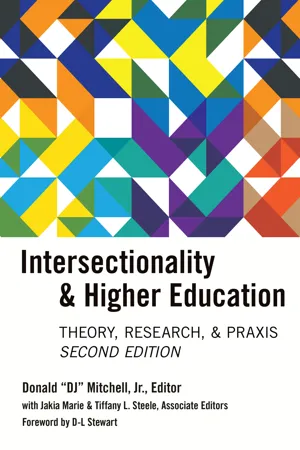
Intersectionality & Higher Education
Research, Theory, & Praxis, Second Edition
- 242 pages
- English
- PDF
- Available on iOS & Android
Intersectionality & Higher Education
Research, Theory, & Praxis, Second Edition
About this book
Intersectionality is a term coined by Kimberlé Crenshaw in 1989. Crenshaw, a scholar of law, critical race theory, and Black feminist legal theory, used intersectionality to explain the experiences of Black women who—because of the intersection race, gender, and class—are exposed to exponential and interlocking forms of marginalization and oppression often rendering them invisible. The second edition of Intersectionality & Higher Education: Theory, Research & Praxis further documents and expands upon Crenshaw's articulation of intersectionality within the context of higher education. The text includes (a) theoretical and conceptual chapters on intersectionality; (b) empirical research and research-based chapters using intersectionality as a framework; and (c) chapters focusing on intersectional practices, all within higher education settings. The volume may prove beneficial for graduate programs in ethnic studies, higher education, sociology, student affairs, and women and gender studies and programs alike.
Tools to learn more effectively

Saving Books

Keyword Search

Annotating Text

Listen to it instead
Information
Table of contents
- Cover
- Contents
- List of Figures and Tables
- Foreword (D-L Stewart)
- Preface (Donald “DJ” Mitchell, Jr.)
- Acknowledgments
- Part One: Theory
- Part Two: Research
- Part Three: Praxis
- Editor Biographies
- Author Biographies
Frequently asked questions
- Essential is ideal for learners and professionals who enjoy exploring a wide range of subjects. Access the Essential Library with 800,000+ trusted titles and best-sellers across business, personal growth, and the humanities. Includes unlimited reading time and Standard Read Aloud voice.
- Complete: Perfect for advanced learners and researchers needing full, unrestricted access. Unlock 1.4M+ books across hundreds of subjects, including academic and specialized titles. The Complete Plan also includes advanced features like Premium Read Aloud and Research Assistant.
Please note we cannot support devices running on iOS 13 and Android 7 or earlier. Learn more about using the app